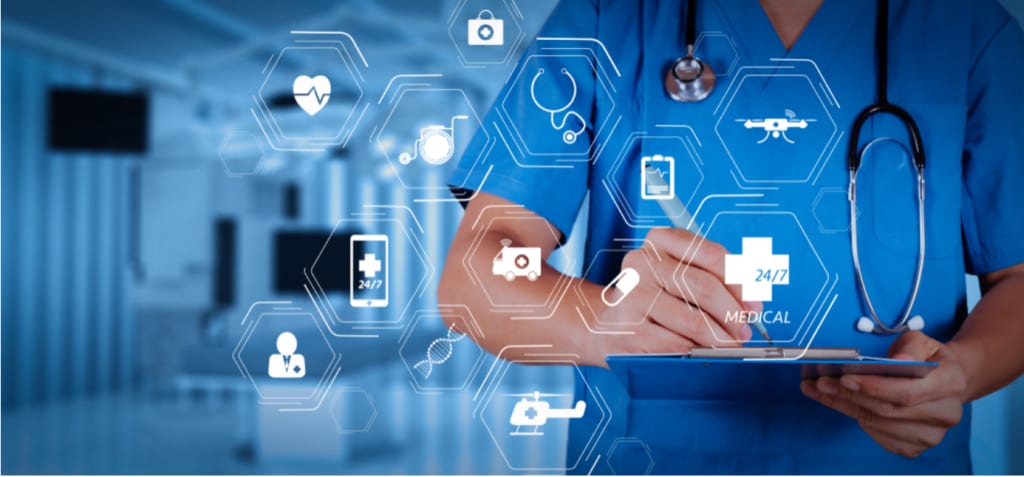Predicting the future of healthcare: 10 takeaways from HIMSS21
Future of Healthcare

The pandemic brought this world to a halt. With social distancing norms implemented, people were not allowed to be close to each other. Still, the effects of the pandemic are felt and people are not convinced to gather at crowded places.
This was the case at the HIMSS 21 (Healthcare Information and Management Systems Society). Which used to be once a place for the most influential custom healthcare software development companies was now occupied by a small crowd that attended the annual health IT conference. The attendance was lesser as compared to the previous years.
Even with the prevalent precautions of COVID-19, there were still considerable networking opportunities deemed too good to pass for many.
HIMSS is a platform where experts talk about the future of healthcare technology, digital health, virtual care and AI (artificial intelligence). Experts also discuss various steps that are taken to eradicate inequalities and cybersecurity attacks, fraud regulations, mental health and much more.
This article talks about the 10 key takeaways from HIMSS 21.
Pandemic forecast
The past few months have seen an unfortunate surge of the COVID-19 virus. According to Johns Hopkins University the infectious delta variant, COVID-19 cases, reached around 205M on Thursday, with the death toll reaching 4.32M.
The US leads the world with total affected caseloads and deaths as the virus spreads like wildfire especially in the states with low vaccination rates. This is due to the challenges which were faced in 2020, such as vaccine hesitancy, misinformation, unavailability of data and the violation of the public health response.
Even with the rising cases, the good news is that we have all acquired a weapon that we can use against the pandemic. “Knowledge”. Even with several vaccines available for use, the general population now carry more information from 2020. The information about social distancing, hand sanitiser, sanitary hand washing, and masking practising.
Speakers also emphasized the importance of international transparency and partnership and inferred how digital tools can aid in managing the crisis of the future.
The speakers from the panel on implementing technology to fight health emergencies said that it is suggested that governments and health systems stress more on evidence-based protocols, establish standardized data sets for public health data reporting, messaging citizens, a governance structure for communicable diseases, ensuring that healthcare organizations have the necessary technology to timely collect and share data, increase the development of digital services and tools to support various health programs in fields like testing, disease prevention amongst other strategies.
Digital health revolution
Experts also said that digital health will play an important role in mitigating some of the biggest problems faced in the US, however, it depends on the adoption.
In a survey by Chartis Group, it was found that 52% of healthcare executives say that they haven't moved beyond the pilot stage of digital integration, even though they understand the need for it.
Around 47% of 220 executives surveyed said that digital integration was their “top organizational priority”, and around 80% have planned to increase their investment in digital in the future.
Experts also said that the collection of data is indeed the first step in especially if you are a healthcare system manufacturer. However, it is important to know how to solve problems with technology even before implementation. Ensuring that any new tool is integrated into a prevalent workflow and has an understanding of how it fits in the overall strategy.
Artificial Intelligence
Artificial intelligence and machine learning were the centres of attraction with many executives of leading systems companies talking about how they have been investing in AI algorithms during COVID-19.
For example Rush Medical Center is developing predictive models to help its social determinants of a health screening platform so that it can connect seamlessly with patients with resources in the community.
Telehealth
Telehealth was propelled during the pandemic with a lot of outpatients visiting switching to digital, overnight. This resulted in vendors and regulators searching for ways to create a structural foundation to support these changes.
Many IT experts argued that the US needs to work towards the construction of a permanent foundation to gain notches during COVID-19 even after the public health emergencies expire.
Interoperability
Interoperability has been creating a buzz for some time now. The HHS has yet to finalize the long-awaited rules codifying key principles of the 21st Century Cures Act that is set to reshape how data will be shared across the healthcare network. Stakeholders eagerly waited for the Office of National Coordinators for Health IT and CMS representatives at the HIMSS 21 to give any update.
Health equity
The COVID-19 pandemic has shed light on the unfairness of the US medical system, putting the whole situation of health discrepancies in front of the public consciousness. The experts at HIMSS said that the pandemic has fueled the discussion, however, meaningful changes will take considerable enterprisewide investments, intended partnerships within the community and deal with a whole lot of data.
Cybersecurity
With the recent increase in cyberattacks, analysts were worried that COVID-19 would accelerate the frequency of breaches and hacks in healthcare. Unsurprisingly cybersecurity was a major theme in HIMSS 21. Experts also stressed that medical companies need to prepare themselves as thoroughly as possible for these types of attacks.
Healthcare Fraud
The rise in fraud with technology is becoming a concern said the HHS Office of Inspector General officials. They also mentioned that for every dollar spent in fighting frauds in healthcare OIG returns around $4 to the federal government. Not only this but there is a rise in fraud in telehealth and mostly involve criminal organizations using fake telemedicine companies and illegal providers that generate fraudulent referrals.
Mental Health
Experts stressed that the issues with mental health are getting worse with the pandemic prevailing. It was also said that mental health should be included in overall health and the aspects of regulations and financing should have defined policies.
Femtech
Last year’s funding reached a record of $14.7 Billion in July for digital health companies. However, most of the population couldn’t get the care that the funding promised. Experts said that Femtech still reminds the stepchild of digital health. Only 1.8% of the investment are accountable for the companies that provide digital health tools for women.
The current market for women’s health tools currently concerns early life concerns like fertility and reproduction and more tools are required in the market for senior care issues and menopause.
Conclusion
The future of healthcare is shining bright with the inclusion of technology. Healthcare providers have understood the importance of technology and how it will shape the future of healthcare. The ultimate goal is the enhancement of the quality of health. Let us see what the future of healthcare will look like with technology.





Comments
There are no comments for this story
Be the first to respond and start the conversation.